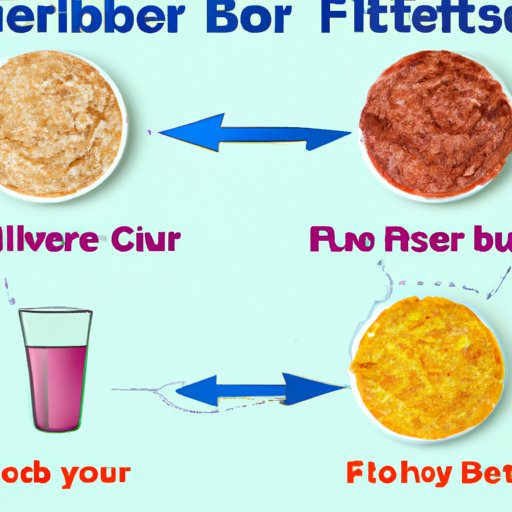
I. Introduction
Constipation is a common digestive problem that affects millions of people worldwide. It is characterized by infrequent bowel movements, hard stool, and difficulty passing bowel movements.
Though constipation is rarely life-threatening, it can cause discomfort and potential complications such as hemorrhoids and anal fissures. This article will explore various ways of preventing constipation by adopting healthy habits and lifestyle changes.
II. Eat high-fiber foods
Fiber is an important component of a healthy diet, especially for healthy digestion and regular bowel movements. A high-fiber diet helps to improve bowel movements and alleviate constipation.
Some high-fiber food items include vegetables, fruits, nuts, seeds, and whole grains. You can easily incorporate more fiber into your diet by adding leafy greens, berries, carrots, avocados, flaxseed, lentils, brown rice, and quinoa to your meals.
It is important to consume a variety of foods as different fiber sources have different effects on digestion. Hence, it is recommended to eat at least 25 grams of fiber per day for women and 38 grams for men.
III. Increase water intake
Dehydration is one of the significant causes of constipation. Lack of water in the body can make the stool harder, making it difficult to pass. It is recommended to drink at least 8-10 glasses of water per day for optimal hydration.
Furthermore, it is not just water that can keep you hydrated. Consuming adequate amounts of hydrating foods such as soups and smoothies can also help promote healthy bowel movements.
IV. Exercise regularly
Physical activity not only helps to maintain a healthy weight but also contributes to improved digestive health. Exercise stimulates the muscles in the digestive tract, promoting healthy bowel movements.
Examples of exercises that can improve digestion include walking, jogging, yoga, and cycling. It is recommended to incorporate at least 30 minutes of moderate-intensity exercise into the daily routine.
V. Limit processed food intake
Processed and refined foods can negatively affect digestion by reducing fiber content and altering gut microflora. It is recommended to limit the intake of these foods and instead choose whole, nutrient-rich foods.
Some tips for choosing whole foods include reading food labels, avoiding foods high in sugar, and adding fruits and vegetables to each meal.
VI. Establish a regular bowel habit
Establishing a consistent bowel routine is critical in preventing constipation. You should set aside a specific time each day for bowel movements and take the necessary measures to ensure that the bowel movements are regular.
Some tips to promote regular bowel movements include avoiding delaying bowel movements, avoiding sitting on the toilet for too long, and being active throughout the day. Additionally, bowel movements are typically easier to pass after meals, so it is crucial to take advantage of this window and visit the bathroom after meals.
VII. Conclusion
Constipation is a common problem that can significantly impact one’s overall quality of life. It is generally preventable, and adopting healthy habits and lifestyles can help prevent constipation. Incorporating high-fiber foods, increasing water intake, regular exercise, limiting processed and refined foods, and scheduling regular bowel movements are some effective ways to prevent constipation.
By making these simple changes or taking preventative measures early, you can avoid the discomforts and complications accompanying constipation, leading to a healthier digestive system and overall well-being.
If you’re dealing with more severe constipation issues, please consult your doctor.
Additional resources to learn more about constipation and how to prevent it can be found at the National Institute of Diabetes and Digestive and Kidney Diseases.




